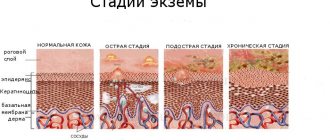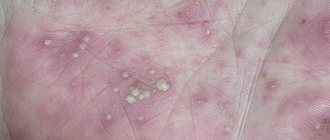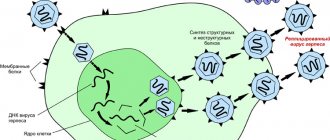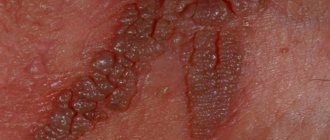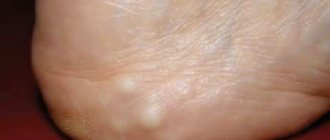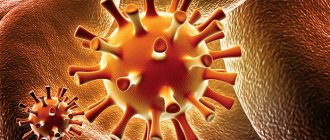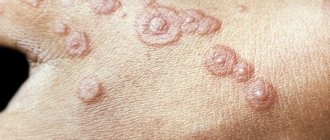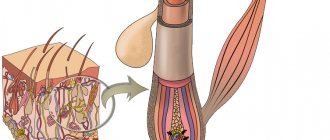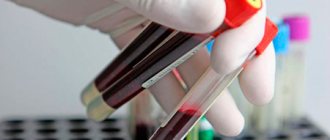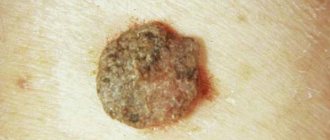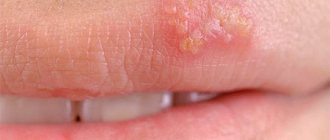It is very important for a man to protect the reproductive part of his own body. Impacts or illnesses cause discomfort and pain. Therefore, if there are any changes in the condition of the genital organ, you should consult a doctor. A not so common disease, “inguinal eczema,” causes serious trouble. The inflammatory process can develop into a chronic stage. For a man, such a development of events does not bode well. Eczema must be treated.
Eczema on the genitals can cause a lot of trouble for a man.
How does the disease manifest itself on the male genitals?
Genital eczema affects both male and female genitalia. They are each characterized in their own way and have peculiarities in distribution, symptoms and treatment. If you go to the hospital in a timely manner, many undesirable consequences can be avoided.
How can a man understand that an intimate organ has been affected by eczema? The first thing I would like to ask proud husbands is not to remain silent about trouble. If you notice that redness or a rash has appeared in the groin, do not hesitate to tell your wife about the problem, do not hide painful feelings to yourself, tell your doctor about the symptoms. The signs of eczema are:
- a small, confluent red rash on the scrotum or penis that constantly itches and burns;
- formed blisters and vesicles that open from time to time;
- voluminous skin erosions that cause pain when touched;
- the disappeared stratum corneum of the epidermis of the male penis, as a result of which the head and testicles are affected;
- damage to the inner sheet of the foreskin, where an accumulation of fluid appears - exudate.
In particularly dangerous cases, other modifications of the phallus occur:
- thickening of the skin was detected;
- deep folds have formed;
- cracks have appeared;
- peeling of dried blisters or vesicles is observed.
Having some of the above symptoms, the man suffers from discomfort and increased irritation. He is deprived of quiet rest. The itching intensifies at night, which leads to insomnia and loss of strength. The nervous system also suffers. To quickly get rid of all this, you should contact a dermatologist to establish a diagnosis and the necessary treatment measures.
Eczema manifests itself as cracking and peeling
Where to look for the root of the evil of eczema?
Inflammation of the epidermis in the scrotum and penis in a man has the same causes as dermatitis in other parts of the body. Eczema on the tissues of the genital organs can be caused by a number of diseases or factors unrelated to clinical illnesses.
More often, the manifestation of rash and itching is the result of the action of external sources on the body:
- household irritants (synthetic fabrics, tight underwear);
- external allergens (washing powder, soap, latex, lubricants);
- unhealthy diet and excess body weight;
- mental trauma, stress at work, unnecessary worries;
- failure to comply with hygienic requirements in caring for the genitals.
As for the pathology of other vital functions of the body, eczema in the groin in men can be caused by the following diseases:
- problems with the gastrointestinal tract;
- diagnosing diabetes mellitus;
- insufficiently effective functioning of the immune system;
- the presence of parasites (worms) in the patient’s body;
- disruption of the endocrine system;
- development of a viral disease (genital herpes or syphilis).
An equally important detail when starting treatment for eczema is information about heredity.
If there is a genetic predisposition, several courses of treatment should be completed. If the patient has already had this disease once, this does not exclude recurrence.
But remember: eczema on the tissues of the penis cannot be transmitted to a partner through close contact! If you are diagnosed with this disease, your significant other is not to blame for anything. Look for the root of evil in one of the above situations.
The herpes virus can trigger eczema
Causes of eczema and other allergies
For an allergic disease to occur, a combination of several factors, external and internal, is necessary.
The basis of the disease is a disruption of the normal functioning of the immune system. The latter consists of several links and many active units - cells and free molecules (antibodies), the coordinated interaction of which is regulated by the nervous and endocrine systems.
Violation of the ratio of different types of cells (for example, a decrease in the number of T-lymphocytes and an increase in the number of B-lymphocytes, the predominance of some types of immunoglobulins over others) can cause a state of sensitization. At the same time, antibodies accumulate in the blood to substances with which a person is constantly in contact and which normally do not cause reactions of the immune system.
The next time such a substance (antigen) enters the body, an allergic reaction occurs. The antigen is attacked by antibodies, the resulting immune complexes settle on special tissue cells, which, under the influence of an irritant, release histamine, bradykinin, and tryptase. These compounds (inflammatory mediators) determine the external picture of skin allergies - swelling, redness, itching.
Another mechanism of allergy is a change in the structure of skin tissues, which begin to be perceived by the immune system as foreign agents. Antibodies are produced to one’s own skin, and when exposed to them, the surface layers of the epidermis die and are desquamated, which causes characteristic eczematous rashes.
Evolution of eczema in the male genital area?
Eczema on the scrotum and eczema on the penis are identical to any other type. Dermatovenerologists claim that the disease has three phases of its development:
The first phase is the initial stage, in which a man discovers small rashes on his own external genitalia, forming red spots, itching appears, and slight swelling of the scrotum is observed. The acute phase is also represented by micro-vesicles, often on the scrotum, which do not merge with each other. These elements tend to quickly open up, turning into a wound of pinpoint erosions.
If you start treatment at this stage, it will take several weeks. As a result, all the bubbles will disappear and the inflammation will stop.
If help is not provided, the disease progresses to the second phase - subacute. After the itching appears, the person gradually scratches the rash, causing pain and irritation to intensify. The man feels discomfort and painful touch. Multiple blistering of a rich red color appears on the skin of the penis.
This stage is considered in medical practice as complicated, so treatment takes a long time.
The third phase - chronic - is characterized by complications in the condition of the skin on the male genitals. In different places, compactions form with increasing infiltration. Inflammation is accompanied by increased swelling of the scrotum, redness of the head of the penis, and progressive erosion, which can lead to the formation of ulcerative wounds. During the second and third stages, severe itching does not stop; constant scratching of the affected areas will lead to bacterial infection, which will only worsen the patient’s condition.
No wonder doctors say that genital eczema is an intractable disease that develops quickly. If at the beginning stage itching and unpleasant sensations can still be dealt with, then the second and third will make a man’s sexual life impossible, complications will arise in the function of the urethra, and pathology of the epidermis.
The first phase is characterized by itching and rashes
Manifestations of eczema on the genitals in women
At the onset of the disease, the labia majora area is the first to be affected. Eczema manifests itself in the form of a vesicular rash, which is filled with serous substance. With strong impact on such places, the bubbles can open and leave behind wet areas. In the affected area, a person experiences severe itching and burning. The affected areas of the skin on the genitals become inflamed, swelling and redness appear. Eczema tends to progress and if treatment is not started in time, it will spread from the labia majora area to the skin of the labia minora, clitoris, pubis, perineum, and anus.
How to help with eczema
How to treat unpleasant eczema in the male groin area? To begin with, we warn you that the disease in the primary phase can be overcome at home by obtaining the necessary consultation from your doctor. But if the disease has progressed into the second and third phases, inpatient treatment under the supervision of a dermatologist will be required to avoid a dangerous complication.
Measures to get rid of eczema are divided into two types: medicinal and folk. If the source of groin inflammation of the skin is some kind of allergen, then this is the simplest way to cure eczema. You simply remove the stimulus to prevent it from having any further effect. In other situations, treatment will take the form of clinical procedures. And they last up to three months. What are the challenges of helping with genital eczema? When providing assistance in a situation with affected skin on the male genital organ, certain features should be taken into account:
- the skin of the penis, especially near its head, is very sensitive, any touch causes pain;
- the organ's access to the open air is almost always blocked by the fabric of underwear;
- This is a place of high humidity.
The benefits of proper nutrition for eczema
You should always eat right, but especially when you are sick. For a speedy recovery and relief from discomfort in areas affected by eczema, you need to follow the following diet. You are allowed to eat: cereal porridges, vegetable soups, chicken broths, vegetables, dried fruits, fruits in moderation and not all of them, citrus fruits and strawberries must be excluded. The diet must include lactic acid products: fermented baked milk, yoghurts (preferably homemade), kefir, matsoni, yogurt.
You should not eat the following foods: fried, fatty, spicy, salted, smoked. It is necessary to exclude chocolate, cakes and other sweets from the diet. Salt can be used for dishes only in limited quantities. In the absence of sound sleep, you can drink mint and lemon balm teas. To avoid recurrences of the disease, you must adhere to the following practical tips:
- use herbal-based intimate hygiene products, avoid using soap;
- wear underwear only made of cotton fabric;
- eat healthy food;
- walk in the fresh air, exercise;
- try not to be nervous.
By following these simple tips, you can quickly recover from eczema on the genitals or prevent its occurrence.
Drug treatment for this type of eczema
Regarding treatment methods: in each specific case, the doctor prescribes individual medications. More often in practice a complex of therapeutic agents is used. Patients are offered the following treatment measures:
- When treating wounds of the skin of the genital organs, use antiseptic drugs. Famous among them are “Furacillin”, “Citeal”, “Betadine”, etc. These solutions for external use are applied to the head of the phallus or to the scrotum. As a result of the action of the medication, inflammation is relieved.
- To relieve pain and get rid of unpleasant irritation after scratching the blisters, use ointments with an anesthetic effect. These include: “Lidocaine”, “Katejel” and others.
- If the inflammatory process develops rapidly, a hormonal agent such as Dexamethasone is suggested. Dispensed as prescribed by a doctor.
- To eliminate painful itching and swelling of the scrotum, it is recommended to take antihistamines - Zodak, Tavegil, etc.
- In the process of scratching wounds, the normal state of the nervous system is disrupted, nervousness, anxiety, fever, and insomnia appear. In this case, doctors strongly recommend valerian, or medications: “Novopassit”, “Persen”.
Eczema in the groin in men should definitely be examined by a dermatologist. Only after a doctor has clarified the causes and stage of the disease can the affected area be treated with traditional methods of treatment.
"Betadine" is an effective antiseptic
Homemade Eczema Remedies
Self-prepared folk remedies against genital eczema are used either at the primary or final stages of treatment. What natural ingredients will help with this disease?
Birch buds
A decoction of birch buds is used as a compress for affected areas. It relieves inflammation and stops itching.
Yarrow
An infusion is prepared from this medicinal plant. Accepted for internal treatment. Add a glass of boiled water to two tablespoons of yarrow and drink three times a day.
Rose hip
Rosehip pulp is added to baby cream - this ointment is used to reduce the redness of the blisters.
Chamomile, rosemary, lavender
Flowers are taken in equal proportions and an infusion is prepared from their mixture. Drink as a prophylactic against nervous irritation and insomnia, and helps relieve inflammation.
Although folk remedies for eczema are prepared from natural ingredients, consult your doctor before use.
Lavender has a good calming effect
How to avoid such a disease?
To avoid genital eczema, adhere to the following preventive indications:
- do not buy underwear made of synthetic fabric, choose only natural fabrics;
- monitor body hygiene, pay attention to any manifestations of pathologies in a timely manner;
- lead a healthy lifestyle, it is especially important to eat a healthy and balanced diet;
- when having protected sex, use proven contraceptives, not cheap latex;
- Do not use detergents that dry out the skin of the body.
These recommendations should be followed if you managed to cure genital eczema, but there is still a risk of getting sick again.
It is possible to overcome the manifestation of eczema on the male genitals. For a positive result, a complex of medical methods is adopted together with traditional medicine.
Since the disease is systemic in nature (allergy, hygiene, dermatitis, nervousness), concomitant diseases must be taken into account. In this case, it will be possible to cure eczema once and for all. And when nothing worries a man and his genitals are in excellent condition, the path to success is very close.
Eczema is a dermatological condition that causes rashes and dry skin. It forms on different parts of the human body, such as arms, legs, face, back. In addition, there is genital eczema, which affects the skin in this area in both men and women.
Description of the disease
It is worth noting that this disease brings a lot of uncomfortable sensations to its owners. A patient with this problem constantly feels itching and general discomfort. Eczema in such a sensitive area is completely painful and limits the possibilities of sexual functions in men or women.
All this happens because the skin in such places has multiple nerve endings. Thus, any damage to particularly sensitive areas on the human body causes pain.
This type of disease is much less common than others. However, it is necessary to familiarize yourself in advance with all the ways of acquiring the disease in order to prevent its occurrence in the future or carry out timely treatment.
The disease can be caused by exposure to the following external factors:
- when using low-quality intimate hygiene products with a high alkali content;
- constant wearing of underwear made of non-natural fabrics, as well as inappropriate sizes;
- allergic reaction to certain components;
- uncontrolled use of antibacterial drugs;
- constant nervous stress, mood swings.
In addition, internal factors influence the development of eczema:
- pathological changes in the digestive organs, as well as helminthic infestations;
- weak immune functions;
- genetic predisposition to the disease.
It turns out that such an ailment is a consequence of disturbances in the functioning of the body, no matter what factors they were caused by. In order to determine subsequent treatment methods, the exact cause must be identified.
Damage to the upper limbs and other parts of the body
Basically, eczema, which affects the upper limbs, as well as other parts of the body, is non-infectious. In addition to physiological inconvenience, the presented disease causes severe psycho-emotional discomfort caused by severe itching.
The reasons for the development of seborrhea in these areas may be the following:
- subjective reaction of the body to allergens;
- imbalance in lung function;
- the development of diseases affecting the gallbladder, its ducts and kidneys;
- immune system imbalance;
- hereditary factor.
Eczema on the elbows begins with profuse redness in the area. Later, the skin begins to become covered with hives, itching and peeling occur. In some cases, eczema on the elbows can provoke the formation of bleeding cracks in this area.
Hand eczema usually affects the inside of the patient's palm. In the first stages of the disease, the patient may observe pronounced redness and peeling in this area. Level 2 hand eczema is characterized by itching. These manifestations can either have a minor degree of severity or cause a lot of inconvenience to the patient, interfering with normal life activities.
Eczema on the back and abdomen is characterized by the appearance of a profuse rash, dryness and the formation of microcracks in the area of the shoulder blades, lower back and lower abdomen. The treatment of this form of disease must be treated with special responsibility. This is due to the fact that, under the influence of external bacterial flora, purulent discharge can be observed in places where microcracks form. The progression of this symptom can lead to infection of the patient’s blood and the development of irreversible complications.
Manifestation of the disease in women
When this pathology worsens, it is impossible to lead a normal sex life. Any contact can cause unbearable pain. Eczema affects the surface layer of skin on the genitals.
In women, eczema begins to appear on the labia. First it affects the large lips, then the rash spreads to the small lips. If this process is left untreated, the disease quickly begins to fill the surface of the skin around the anus, as well as the area near the inner thigh, with inflammation.
It is impossible to say for sure about the spread of the disease to the woman’s internal genital organs. However, in medical practice there have been situations when, with an advanced form of eczema, inflammation spread to the surface of the vagina and uterus.
Do not forget that neglected disease quickly becomes chronic. If provoking factors constantly arise, then exacerbations are observed several times a year.
Symptoms
First of all, it is worth noting that the skin manifestations of inguinal eczema are significantly different from other eczematous rashes.
The disease begins with a feeling of discomfort in the groin area, which intensifies during periods of physical activity. As the disease develops, the unpleasant sensations are accompanied by bright pink spots, limited by a red ridge. A few days after the spots appear, the skin inside the roller dries out and begins to peel off profusely.
Subsequently, if the patient does not receive proper treatment, the rashes merge with each other, affecting large areas of the skin and spreading throughout the body. Moreover, often on flaky spots a wound surface appears, covered with serous fluid, which leads to constant weeping and further complicates therapy.
In addition to skin rashes, patients experience:
- itching;
- burning;
- soreness;
- swelling.
Genital eczema can spread to the following areas:
- pubic;
- male genitals and scrotum;
- woman's labia.
Eczema bordered, developing on the pubis, in the vast majority of cases is acute in nature, however, occasionally it can become chronic. The main symptoms of this form are swelling of the skin and fluid-filled blisters that quickly open and dry out.
Eczema of the genital organ and scrotum is accompanied by the appearance of blisters, swelling and redness of the genitals, the formation of erosions and severe weeping.
Eczema on the labia is manifested by the appearance of blisters, severe itching, erosion of the mucous membranes and skin, and the appearance of peeling.
Symptoms of the disease in men
Eczema in the groin in men usually does not affect the penis; the scrotum is affected by swelling. The testicles begin to become inflamed and increase in size - this is the main sign of the disease. Such symptoms prompt a man to undergo examination.
As the disease develops, the following signs appear:
- the primary rash is localized on the testicles, and then begins to spread to the penis;
- the resulting papules quickly rupture;
- there is pain when touched;
- weeping type lesions spread over the entire surface of the scrotum;
- the protective layer of the epidermis is damaged.
- fluid accumulates under the foreskin.
Inguinal eczema of the chronic type, on the contrary, is accompanied by keratinization of the skin. Pronounced cracks and peeling appear. In this case, the patient feels extremely uncomfortable.
Sometimes such an illness can significantly worsen the quality of life and reduce a person’s performance. In addition, a man may experience neurological disorders due to intolerable itching. If hygiene is not observed and seals are damaged, you can easily get a fungal infection.
Treatment
This is one of those dermatological diseases that needs prompt treatment. This is the only way to prevent the disease from becoming chronic. The sooner treatment is provided, the greater the patient’s chances of successful recovery.
All symptoms of the disease do not improve over time, but only get worse. Also, during treatment, it is worth considering that the skin in this area is the most sensitive.
Distinctive features of the treatment of eczema on the genitals:
- there is almost no contact with air;
- constant accumulation of moisture;
- Due to sweat secretion, secondary skin damage may occur.
Usually drug therapy is not carried out for more than 60 days. In each individual case, a regimen for taking certain medications is drawn up.
Drug therapy includes:
- Eczema on the male penis or female genitals should be treated with antiseptics several times a day to prevent the development of bacteria;
- To relieve pain, ointments for local anesthesia are used;
- In advanced cases, hormone therapy is used;
- To relieve the patient from itching, antihistamines are prescribed;
- Sedatives should be used for neurological disorders caused by eczema.
IMPORTANT! To prevent the formation of various skin diseases, you should only have sexual intercourse with a regular partner.
If the patient seeks help in time, then in most cases the disease goes away without a trace. However, a person without medical education cannot determine for sure how to treat a disease in a particular case. Therefore, self-medication can have a detrimental effect on your health.
Eczema is a non-infectious disease characterized by such manifestations as skin rashes, itching, inflammation, crusting, and sometimes weeping. In the etiology of the disease, doctors note different points, including internal factors, as well as external factors in the form of allergens. Relieving the symptoms of eczema is a challenge for many doctors and patients. Depending on the stage of the disease, the effectiveness of medications, procedures, and dosage changes.
As soon as a person discovers itching and redness in the groin area, this is a reason to consult a doctor. He will diagnose the disease and prescribe treatment. The sooner this happens, the better for the patient. Below we will consider the causes of eczema in the groin in men and women, symptoms, and learn how to treat the disease.
Types of eczema
Depending on the causes of the disease, the following types of eczema are distinguished:
- plaque eczema;
- candidal eczema (mycotic);
- horny eczema;
- true;
- seborrheic eczema;
- professional;
- varicose eczema;
- atopic;
- childhood eczema;
- dyshidrotic;
- reflex eczema;
- eczema of the genital organs (eczema of the uterus);
- infected eczema.
Plaque or coin-shaped eczema gets its name due to the round shape of the affected areas of the skin, which resemble a coin. It appears most often on the following areas of the skin: back, ankles, arms. Sometimes there is coin-shaped eczema on the butt. The affected areas itch and become covered with a yellowish crust.
Candidal eczema belongs to the mycotic type, that is, skin lesions that were caused by various types of fungi. In this case, Candida mushrooms. It is known that these fungi belong to the opportunistic flora of the human body, but under certain conditions they can cause illness. Candida fungi can cause eczema when a person has a weakened immune system, improper functioning of the sweat glands, vitamin deficiency, intestinal dysbiosis, or improper metabolism. Most often, candidal eczema affects skin folds, genitals, skin between the fingers, armpits, chin, upper lip (in men).
Horny eczema is characterized by calluses on the driest areas of the skin, for example, the heels and palms of the hands.
True eczema is characterized by a rash that appears in islands in various parts of the body (face, heels, hands), often in a symmetrical manner. Most often, this type of disease occurs when the patient comes into contact with chemicals and various allergens. Seborrheic eczema can be classified as a mycotic type of eczema, since it is provoked by fungi that live in the body's hair. This type of disease can also affect the most “oily” areas of the skin, such as the frontal part of the face and chin. Seborrheic eczema forms dry, scaly growths on the skin.
Occupational eczema most often affects people who, because of their profession, are forced to constantly come into contact with chemicals (household, industrial). The rashes are most often located on the hands, face, neck, and genitals (in men).
Varicose eczema is characterized by damage to the skin of the legs, which is preceded by varicose veins. This type of disease occurs most often in older people, since they are the ones who suffer from varicose veins due to a sedentary lifestyle.
Atopic exodermatitis or atopic dermatitis is a recurrent eczema, which is characterized by severe itching and redness of the affected areas of the skin. Atopic dermatitis is a very common disease in the world. According to statistics, it affects about 10 percent of children in the United States. Atopic eczema can be inherited.
Infantile eczema most often affects infants. Eczema on a child’s body usually affects the arms, legs, neck, and sometimes the chest. This disease can be inherited. Infants whose diet is dominated by artificial nutrition are especially susceptible to childhood eczema. Dyshidrotic exodermatitis can be caused by dysfunction of the sweat glands. This disease can occur in people with excessive sweating of the palms and feet. Dyshidrotic eczema can occur as a result of severe nervous shock or high temperature outside.
Reflex eczema occurs when the skin is highly sensitive to various types of irritants. This type of disease is characterized by the appearance of moisture on the affected areas of the skin.
Genital eczema can affect women's labia, uterus, penis and testicles. This type of disease can be recurrent. Patients usually complain of itching of the skin of the genital organs. The question immediately arises: is it possible to become infected with this disease through sexual contact? This type of eczema is transmitted only hereditarily and cannot be infected through sexual contact.
Infected eczema can be caused by Staphylococcus aureus, so eczema on the body is characterized by golden-colored scales. Areas affected by bacteria should never be scratched, since then you expand the “field of activity” for other pathogenic bacteria.
Causes of eczema in the groin
The main cause of the disease remains a mystery to specialists; many theories have been put forward about what causes the symptoms, what complicates the disease, and what factors accelerate the disease process. But all doctors agree on one thing - the disease is multifactorial, that is, it appears not for one reason, but for two or more, which has been proven by multiple studies. Most often, patients experience increased symptoms upon contact with allergens, which indicates the allergic nature of the disease.
There are many theories about the cause of eczema. They are divided into the following types:
Internal factors:
- The hereditary theory is confirmed by the fact that in 75% of cases when the father and mother have eczema, a child is born with the same disease.
- Disruption of the endocrine system and improper production of hormones in the blood. For example, with obesity and diabetes, the secretion of the sebaceous glands is disrupted and this leads to the appearance of symptoms.
- Many patients noticed that after stress, symptoms intensify. This may also be the cause of the disease.
- Diseases of organs and their systems: gastrointestinal tract, central nervous system, cardiovascular.
- Poor metabolism and immune defense.
External factors:
- Inappropriate medications, allergic reaction to the composition of antibiotics and other drugs.
- Allergies to chemicals such as household chemicals, skin and hair care products, cosmetics.
- Bad ecology.
Possible causes of eczema on the genitals
The inflammatory process that occurs in the upper layers of the epidermis is most often provoked by the same reasons as other forms of dermatosis. The consequences of the disease without timely treatment can be quite complex. At the same time, it is impossible to get rid of the disease on your own, so you should definitely go to see a specialist. He will make an assumption about the cause of the development of the disease, determining in a specific clinical case what type of eczema on the genitals is.
Dermatosis on the genitals is a rare occurrence
The most common forms of dermatosis are:
- dry;
- weeping;
- idiopathic;
- allergic;
- dyshidrotic.
Regardless of the type of disease that occurs, most often the first manifestations of the disease are caused by the following factors:
- hereditary predisposition;
- disturbances in the functioning of the endocrine system;
- weakening of the body's immune forces;
- chronic diseases of the digestive and gastrointestinal tract;
- infections, parasites;
- diabetes.
Speaking about the causes of the disease, it is worth noting that eczema of the external genitalia does not pose a danger to another person, the disease does not transfer from diseased skin to healthy skin. The non-infectious nature of the origin of the disease is in no way related to the patient’s sexual contacts. At the same time, one often has to look for the cause in contraceptives: individual immunity to latex products, an allergic reaction to fragrances and lubricants are common provocateurs of eczema.
Symptoms of eczema in the groin
The symptoms do not so much undermine the patient’s physical health as their psychological health, since during intimate relations a person experiences pain, the genitals itch, itch, redness and other symptoms appear on them.
Symptoms of eczema between the legs differ between women and men. But according to statistics, this pathology is more common in men. Symptoms should be treated immediately for both sexes; you should contact experienced specialists to relieve discomfort and restore sexual life.
Eczema in the groin in men
With eczema in the groin in men, symptoms appear on the testicles, penis, scrotum, pubis, glans, the symptoms remain general, you can view a photo of it, and your doctor will tell you how to treat it.
Symptoms differ depending on the stage of the disease. Eczema appears in men in the area of the scrotal folds, on the hips, and pubis. The first symptom is characterized by the formation of red spots in the intimate area. Most often, they first form on the testicular area and gradually spread to the penis. The area of the testicles swells and they increase in size. Rashes and papules appear, which open faster in the genital area than in other locations. The affected areas itch, and when the papules are opened, pain appears.
The disease gradually spreads throughout the genital organs. The entire area turns red, and when the head is affected, fluid secreted from the bursting papules collects under the foreskin.
The chronic stage of eczema is distinguished by its severity, as the skin on the genitals thickens, it cracks, and the skin flakes off. This affects the emotional state of the patient, since pain and itching cause constant discomfort. If a bacterial or fungal infection gets into the wounds, complications arise
The main causes of this type of eczema
Eczema occurs due to the presence of a fungus, but is explained by an overactive immune system. The main reasons include:
- Impaired functioning of the nervous system;
- Excess local immunity in the area of primary inflammation;
- Increased sweating.
Eczema begins in the anus, groin and labia area with the appearance of slight redness. Then swelling appears, accompanied by severe itching of the labia and other affected areas. Over time, eczema spreads throughout the body, which can lead to unpleasant complications. All this can be seen in the photo.
Treatment of eczema in the groin
When the first symptoms appear, you should immediately contact a dermatologist, he will tell you how to treat groin eczema.
Treatment of groin eczema in men and women should be read in a timely manner. If treatment is not started in time, complications may arise that will be very difficult to cope with. And if the papules begin to open and the area is not treated with an antiseptic, a fungal or bacterial infection may occur.
First, the doctor will diagnose the disease. The doctor sends him for tests, but many experienced doctors can accurately diagnose only with a visual examination. The patient undergoes allergy tests to identify substances to which he is allergic.
A biopsy is performed in cases where it is not possible to accurately determine the diagnosis. And based on the test results, the medicine and its dosage are selected. The use of drugs in combination will improve their effectiveness. With it, symptoms can go away in 10-15 days.
The doctor prescribes antifungal medications and antihistamines to relieve an allergic reaction. In the chronic stage, since conventional drugs no longer help, hormonal drugs are prescribed. Under no circumstances should you choose your own medications, especially hormonal ones, and use them not according to the instructions. This can worsen the course of the disease and lead to complications.
An additional diet is also prescribed that excludes any allergens from the diet. It is forbidden to eat fried, smoked, salted, spicy food, strong tea and coffee, eggs, honey. You should eat steamed food and drink at least two liters of water a day. It is recommended to observe the rules of genital hygiene, use medications strictly according to the indicated dosage and regularly.
Treatment of eczema in the groin with folk remedies
Folk remedies used to effectively relieve the symptoms of eczema, but now modern drugs cope with this task much better. There are many cheap and safe products that have undergone clinical trials and are absolutely safe for health, so they should be given preference. However, traditional methods are often used even in complex therapy. They are most effective at the beginning of the disease, and they also improve the effect of conventional drugs.
There are many methods for treating eczema in the groin using traditional recipes. For example, compresses are prepared from birch buds or white vinegar to relieve inflammation and itching; yarrow, chamomile, St. John's wort and eucalyptus are often used as tinctures to treat illness from the inside; A cream is made from rose hips and the affected areas are treated with it; oak bark, string, flax are used for lotions.
Treatment of eczema in the groin with medicinal methods
The most effective method of treating eczema in the groin is a complex. It should include drugs of various forms and nature, directions. So, the doctor should prescribe an antifungal agent, an antihistamine to reduce the manifestations of allergies, and conventional drugs to relieve symptoms. It is recommended, with the permission of a doctor, to use traditional medicine recipes; they will enhance the effectiveness of the medications.
Antifungal agents include ointments containing miconazole, terbinafine (for example, Lamisil). They are gentle on the skin.
Ointments containing zinc relieve inflammation and redness.
The wet areas must be dried; for this it is recommended to use traditional medicine recipes and herbal decoctions. It is also necessary to treat the affected areas with antiseptic solutions, for example, iodine. It is recommended to treat the skin with Fukortsin.
Antihistamines will reduce sensitivity to allergens; these may be Suprastin, Zyrtec, Loratadine.
Antibiotics are prescribed in the chronic stage, as well as hormonal drugs if the usual ones do not work. Hormonal medications are divided into weak, medium and strong. But they have many side effects and contraindications and can be addictive. They should not be used by pregnant, nursing or children.
For genital eczema, doctors recommend medications such as Mycoseptin, Lamisil, Triderm, and in the chronic stage Erythromycin, Metronidazole. They relieve itching, inflammation, redness, and peeling. They must be used strictly according to the instructions.
Immunodeficiency can cause complications, in which case it is necessary to combat its manifestations in order to get rid of the symptoms of eczema.
Consequences
Since during exodermatitis the skin peels and cracks, it is easier for harmful viruses and bacteria to penetrate through it into the body, where they begin their vigorous activity. Eczema has a negative impact on a person’s state of mind: patients often suffer from nervous disorders and are tormented by insomnia. Often this disease becomes chronic. To prevent eczema, you should harden your body, practice relaxation techniques, use rubber gloves for any contact with chemicals, try not to eat junk food, and not lead a sedentary lifestyle. Remember that timely diagnosis of the disease will increase your chances of a speedy recovery without serious consequences for the body.
Prevention of eczema in the groin
To prevent complications during the treatment of eczema in the groin and prevent the disease, the following preventive measures should be taken into account:
- Follow a special diet for eczema, take vitamins B, A, D, E, C, drink at least 2 liters of water per day, follow a daily routine.
- Experience light physical activity.
- Do not come into contact with substances that cause allergies and other allergens, such as household chemicals, unnatural cosmetics, low-quality clothing and shoes.
- Maintain genital hygiene.
- If symptoms or complications appear, consult a doctor for diagnosis/medication.
- Do not self-medicate to improve the quality of treatment.
Prevention
As you know, any disease is easier to prevent than to treat. And eczema on the genitals is no exception. Moreover, it is quite simple to do this. So, in order to avoid the disease you should:
- eat right (the diet should be balanced and not include fast food products);
- consume enough vitamins;
- to live an active lifestyle;
- to refuse from bad habits;
- maintain normal weight;
- avoid stress and chronic fatigue;
- keep the skin perfectly clean;
- wear underwear and clothes made from natural fabrics;
- consult a doctor when the first signs of illness appear.
If rashes have already appeared on the body, then the following measures can help alleviate the patient’s condition:
- taking a hygienic shower after any physical activity accompanied by increased sweating;
- treating rashes with talcum powder or baby powder;
- wearing comfortable underwear, made from natural materials and fully corresponding to the size of the patient (in this case, boxer briefs may be recommended for men);
- frequent washing - this will prevent the spread of pathogenic microflora to healthy skin;
- sleeping naked at night will allow the body to breathe.
Washing clothes should be done with baby or any other hypoallergenic powder, followed by a thorough rinse in running water.
These measures will help prevent the disease, and if it has already appeared, cure it faster.
